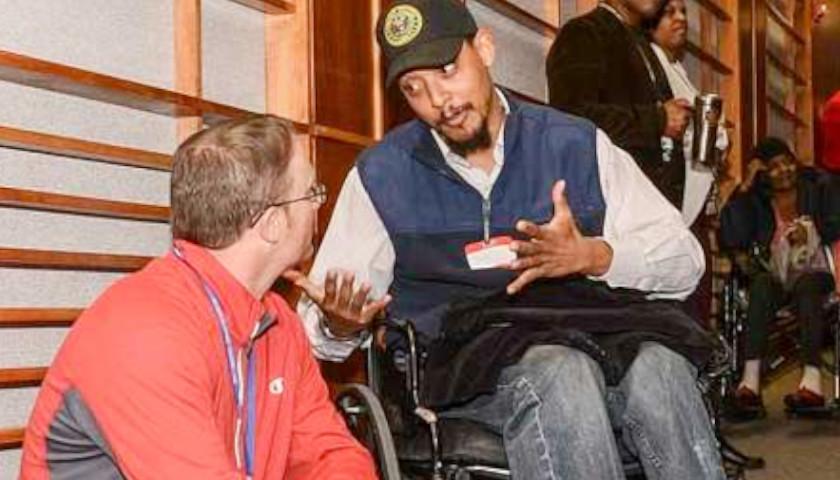by Natalia Mittelstadt
With the recent expiration of the federally mandated 2-year window for preservation of 2020 presidential election records, counties across the country have been inundated with public records requests from Americans concerned about election integrity.
During his “Moment of Truth Summit” last month spotlighting 2020 presidential election irregularities, MyPillow CEO Mike Lindell exhorted “every single person in the country” to ask for cast vote records from the election from their local county clerk’s office. His website links to the Ordros Analytics, Inc., website, which provides templates of public records requests for cast vote records.
Cast vote records are files that list “information about one ballot in the order [that it was] processed,” according to Ordros Analytics, which has a master Cast Vote Record repository of counties that have released their records. The record “will contain all of the votes made on that ballot … This allows a data analyst to ‘replay’ the election ballot by ballot to spot unnatural patterns of voting.”
According to the instructions provided by Ordros Analytics for submitting public records requests for cast vote records, those records contain no information that could identify voters.
Cast vote records show, in order, patterns of voting for a particular candidate, which is a model that should reveal whether further investigation is necessary, according to Phill Kline, director of voter integrity watchdog The Amistad Project. Such records ought to be retained automatically, he told Just the News on Wednesday, adding that “scientifically valid, risk-limiting audits are a way of doing that.”
Under federal law, states and localities must preserve federal election records for 22 months after each election. That minimum window for the 2020 presidential election elapsed on Sept. 3, so as of that date states were legally permitted to destroy their 2020 records, barring additional state preservation requirements.
With many counties flooded with public records requests for 2020 election records, several have claimed that the demands are interfering with administering the 2022 midterm elections.
In Washington County, Tennessee, the administrator of elections, Dana Jones, said that the election commission’s office received between six and 10 calls a day last week from local residents seeking copies of 2020 presidential election records. She attributed the requests to Lindell’s election integrity summits.
“With 10 weeks to go before the November election, this has become a distraction,” Jones told Johnson City Press on Thursday.
She said that neighboring counties have received similar requests for 2020 election data.
Tennessee is currently ranked No. 1 on the Heritage Foundation’s Election Integrity Scorecard.
In Warren County, Ohio, the Board of Elections has received seven requests for essentially any records related to the 2020 presidential election, including copies of all ballots cast and voting machine results tapes.
Ohio Association of Elections Officials President Brian Sleeth, who directs the county’s election board, explained that voting machine tapes are similar to grocery store receipts, but they are “about 60 to 70 feet long each” and recorded twice a day.
As a result of such requests to election offices across the state, the counties will keep the records for the time being despite the federal deadline expiring, Sleeth told the Statehouse News Bureau.
The Warren County Board of Elections, along with other county election boards, are seeking guidance from county prosecutors on complying with the requests. Sleeth said that extra personnel may need to be hired by some boards to meet the demand for the requested records.
In Illinois, Madison County Clerk Debbie Ming-Mendoza said that her office has been bogged down by “frivolous” and invasive Freedom of Information Act requests, according to The Telegraph.
“To track who votes for who or what and provide that information to another party is a real invasion of a person’s privacy,” said Mendoza. “I believe residents want their vote to be confidential and not reviewed.”
The Illinois State Board of Elections told Ming-Mendoza that the county isn’t responsible for information its voting system doesn’t collect.
According to the voting machine company ES&S, which provides Madison County with technical election support, the county’s voting machines don’t provide the data sought by the requesters.
Other county clerks have received similar FOIA requests, Ming-Mendoza said. She added that the state’s cyber security exemptions provision applies to the FOIA law, protecting confidential voting information from people seeking to access it. She said her office has complied with state FOIA laws and will continue providing information in response to “rational” FOIA requests.
Ming-Mendoza confirmed to Just the News on Wednesday that the FOIA requests her office received were for 2020 cast vote records.
In Colorado, county clerk offices are also experiencing a flood of public records requests for the 2020 election following Lindell’s summit.
Executive Director of the Colorado County Clerks Association Matt Crane compared the increase in requests to a denial-of-service cyberattack, preventing county clerks from performing their duties.
“We have nothing to hide,” Crane said, according to Colorado Newsline. “There’s no honor to what these people are doing, there’s no integrity to it. It’s just helping them continue their grift.”
Some clerks’ offices posted the 2020 cast vote records on their websites in response to the numerous requests for the same information.
Colorado has a 25-month retention requirement, which means the records can’t be disposed of under state law until Dec. 3.
An election security consultant for the federal Cybersecurity and Infrastructure Security Agency Ryan Macias, also compared the influx of election records requests to a denial-of-service cyberattack, which is when hackers try overwhelming a network with internet traffic. He added that it creates potential security risks in addition to the stresses election workers are otherwise experiencing, Reuters reported.
Kline said the county clerks’ reactions to the public records requests may be overstated in some cases but are not completely invalid and that it shows how state legislatures “have failed to make these records normally available.”
Voting “machines aren’t transparent,” Kline said, noting that Democrats in 2004 claimed machines flipped votes for then-President George W. Bush.
The clerk’s office in Dane County, Wisconsin, received about 50 cast vote records requests over two days.
In Crow Wing County, Minnesota, which Trump won by 30 points in 2020, the board voted to make the cast vote records public.
In Maricopa County, Arizona, the recorder’s office had received nearly 500 public records requests by early August, which was 130 more than 2021, according to Reuters.
Some critical counties in battleground states have released their cast vote records, which have been posted on Ordros Analytics’ website. In addition to Maricopa, these counties include Fulton County, Georgia; Allegheny County, Pennsylvania; and Brown and Dane counties in Wisconsin.
– – –
Natalia graduated from Regent University with Bachelor of Arts degrees in Communication Studies and Government.
Photo “Election Day 2020” by Phil Roeder. CC BY 2.0.




